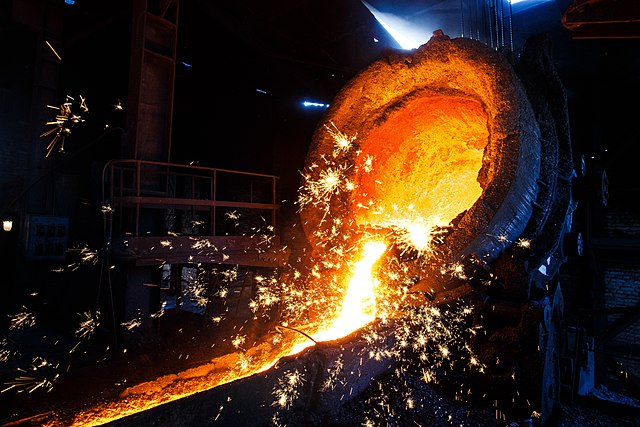Iron metal plays a crucial role in various industries due to its abundance, versatility, and diverse range of properties. Here’s a comprehensive guide to the role of iron in different sectors:
1. Construction Industry:
- Structural Steel: Iron, in the form of steel, is a fundamental material in construction. It provides the framework for buildings, bridges, and other structures due to its high strength and durability.

- Reinforcement Bars (Rebar): Iron rods or bars, known as rebar, are commonly used to reinforce concrete structures, enhancing their strength and resilience.
2. Automotive Industry:
- Automobile Manufacturing: Iron is a primary component in the production of vehicles. It is used for engine blocks, chassis, and various components due to its strength and heat resistance.
- Cast Iron Parts: Cast iron, a type of iron alloy, is used for engine blocks, brake drums, and other automotive components that require excellent wear resistance.
3. Manufacturing Industry:
- Machinery and Equipment: Iron is used in manufacturing heavy machinery, equipment, and tools. It is a crucial material for its strength and machinability.
- Pipes and Fittings: Iron pipes are commonly used for plumbing, water distribution, and sewage systems due to their corrosion resistance and durability.
4. Aerospace Industry:
- Aircraft Manufacturing: Iron alloys are used in aircraft components, such as landing gear and engine parts, due to their high strength-to-weight ratio.
5. Energy Industry:
- Power Generation: Iron is used in power plants for boilers, turbines, and other components due to its ability to withstand high temperatures and pressures.
6. Electronics Industry:
- Transformers and Cores: Iron cores are used in transformers and inductors to efficiently convert and transmit electrical energy.
7. Medical Industry:
- Medical Devices: Iron-based alloys are used in medical devices and equipment, including surgical instruments and MRI machines.
8. Environmental Industry:
- Water Treatment: Iron is used in water treatment processes to remove impurities and contaminants from drinking water.
9. Agriculture Industry:
- Farm Equipment: Iron is a key material in the manufacturing of farm equipment, including tractors and plows.
10. Infrastructure and Transportation:
- Railroads: Iron was historically essential in the construction of railways, including rails, bridges, and locomotives.
- Shipbuilding: Iron and steel are used in shipbuilding due to their strength and resistance to corrosion in marine environments.
11. Consumer Goods:
- Household Appliances: Iron is used in the production of appliances such as refrigerators, stoves, and washing machines.
12. Art and Architecture:
- Artistic Sculptures: Iron is sometimes used in artistic sculptures and architectural elements due to its malleability and aesthetic qualities.
13. Infrastructure Development:
- Bridges and Tunnels: Iron and steel are crucial materials in the construction of bridges and tunnels, providing strength and durability.
14. Military and Defense:
- Weapons and Equipment: Iron-based materials are used in the manufacturing of military weapons, vehicles, and equipment.
Iron, in its various forms and alloys, is an integral part of modern industry and infrastructure. Its unique properties, including strength, durability, and heat resistance, make it indispensable in numerous applications across diverse sectors. Advances in metallurgy and technology continue to expand the range of iron-based materials and their applications.











